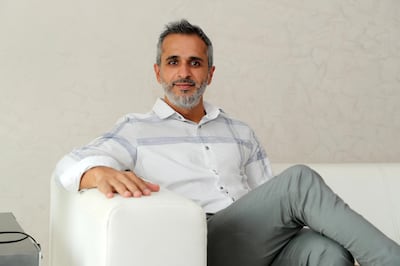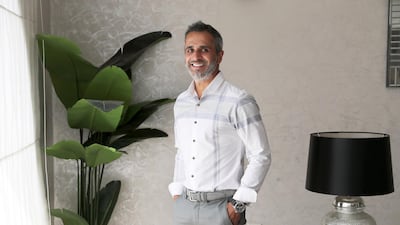Dhiren Harchandani knows what it’s like to quit the rat race and focus on the things that truly matter. Having begun his career consulting to corporations in Silicon Valley, he has led companies in the retail and manufacturing sectors with sales in excess of $400 million. After a number of significant personal challenges, he put his experience to use as a business and life coach and says he has advised clients whose businesses represent a combined revenue of $500m.
Now a transformational business coach in Dubai, the Indian national, 44, lives in Jumeirah with his wife Jasmine, an apparel entrepreneur, their two sons, Arhan, 11, and Mikhayl, 10, and their dog, Zen.
Where did you grow up?
I was born in Mumbai. My family migrated to the Philippines shortly after to start a business from scratch in what was then one of Asia’s tiger economies. Both my parents, but especially my mum, were very smart with money, so I learnt incredibly young about business and the value of money and always had an allowance to manage.
What were your earliest lessons about money?
I remember once in college, around the age of 19, when I’d spent my allowance and didn’t have $10 to do my laundry. That’s when I realised I needed a job, so I cut the financial umbilical cord and started working part-time. The pride and sense of accomplishment from making my own money was truly exhilarating.
What was that first job?
Working as a librarian at the University of the Pacific in California, where I was studying. I was paid $5.50 per hour. I also had a second job for the alumni association. We were paid in tips, but I often made $50 per hour on the average.
Who has been your biggest financial inspiration?
Warren Buffett. His investing approach is like the shopping style of a bargain hunter – very practical and down-to-earth. But that attitude extends to other areas of his life: he’s lived in the same modest house for decades, he drives himself to work in the same car he’s had for as long as he’s had his house. I admire that congruence in all aspects of his life.
Are you a spender or a saver?
I was a spender in my early 20s and turned saver in my late 30s. In the first years of my career working in corporate America as a consultant, I couldn’t spend fast enough. I remember, in my first job I was making a salary of $52,000 in 1999, significantly more than my peers, and that was justification enough to buy a new BMW 3 Series for $33,000.
How did the transition to saving happen?
My attitude changed when I was invited to a real estate seminar and met a lot of people my age who owned multiple properties. They were all professional savers, putting their capital into real estate and reinvesting the rent back into the market. That cycle made them rich. It was a pivotal moment for me and I became more prudent with my finances. I also worked towards getting my real estate agent’s licence so I could learn everything I could about investing in property.
Where else do you invest?
Mostly retirement accounts, 401K accounts and online brokerage accounts. I prefer automated online services to commission-linked accounts from traditional institutions because I think they’re far more competitive offerings when it comes to fees and commissions. In addition, I like to invest in hard assets: real estate, precious metals and medium-large cap companies that pay a dividend.
What has been your best investment?
Besides my business, my best investment of all time has been Bitcoin, which has gone up 10x since I invested in 2013. That said, this is not investment advice and you should be aware that crypto as an asset class is highly speculative and volatile.
As someone who worked on Wall Street, what’s the biggest financial lesson you’ve learned?
During my second job out of college in March 2002, I was surrounded by professional market traders who were the best in the world, and whom I asked for investment advice and trading tips. I quickly learnt that what made them the best traders in the world was that they were trading other people’s money, which meant they were fearless and made rational, not emotional, decisions when trading. As soon as they started trading their own money, they’d lose that Midas touch, because they got emotional and would either sell too early or too late.

What did you learn from that experience?
Not to try to time the market. I adopt a buy-and-hold strategy in terms of stocks and bonds. I subscribe to Paul Graham’s value-based model: understanding the product/service of the company at an elemental level can give you the strength to hold when Wall Street’s perceived value is misaligned with the business’s fundamental value. Similarly, in terms of exiting investments, you always need a clear exit strategy, which will vary based on the volatility of the investment and other metrics.
What is your most cherished purchase?
As an essentialist, I don’t buy many things, and once something no longer serves a purpose, I try to hand it over to someone who can get value from it. Although I’ve stopped wearing it, I would have to say my Patek Philippe Nautilus 5712R, which I bought for $33,000, is my most cherished purchase. It is a storehouse of value. While most material purchases depreciate to zero, this has doubled in value.
Why don’t you wear that luxury watch anymore?
I was an avid watch collector but stopped buying and wearing luxury watches when my whole model of the world shifted after a particularly rough time personally. My personal dark night of the soul began when I was faced with a choice: stay with my wife who was about to deliver our first child, or get on a plane to close a major business deal. I was also dealing with several health issues at the time, and over this period – from 2009 to 2013 – I came to the realisation that very few things matter in life.
Ninety per cent of what we do is noise. Everyone seems to be really busy all the time and is perpetually behind the time curve, but a lot of what we do doesn’t add value to our lives. So, I have a 90 per cent rule: if you’re not 90 per cent sure you should be doing something, don’t. I implemented that philosophy in 2015, and it’s paid off massively since.
What’s the biggest financial transformation you’ve brought about in your life?
Two transformations come to mind. The first was a series of properties I bought and sold, which I got very lucky with in terms of timing. One was an office unit in Jumeirah Lakes Towers that I purchased for Dh800,000 and subsequently sold for $1.8 million – so over 100 per cent my purchase price.
The second would be the exit in 2013 of our software-as-a-service property management business to Realpage.com, one of our competitors in North America. We were acquired for 6.5x our revenue, which was around $3 million.
How much money can a lifestyle or business coach earn?
As a coach, you’re essentially limited by the number of hours you can work in a day – and you can potentially earn more from group coaching than from one-on-one lessons. Therefore, the level of income varies widely subject to the business model and can range from $100,000 to $10 million at the very top.
How did the coronavirus impact your practice?
My coaching practice had seen a growth of 100 per cent during Covid-19. The uncertainty of the future caused a lot of people to feel anxious and overwhelmed and question what they want. That’s where I come in as a coach, because fundamentally, coaching is all about helping people figure out what they want and outlining steps toward getting it.
What financial advice would you offer your younger self?
I’d tell my 18-year-old self to start saving and to learn about the power of compound interest.

